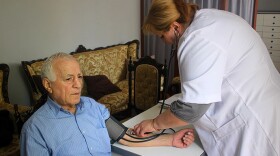A program created in Kentucky that’s been shown to encourage mild exercise and social interaction among the elderly has been awarded a $503,800 grant. The funding provides the latest expansion of the 'Bingocize' program that will take it into 40 nursing homes across Tennessee.
Western Kentucky University Associate Professor of Exercise Science Jason Crandall created the program in 2011 while he was on the faculty of Kentucky Wesleyen College in Owensboro. It combines bingo with short intermissions of stretching and other simple exercises.
Crandall and the WKU Center for Applied Science in Health and Aging, or CASHA, were awarded Civil Monetary Penalty reinvestment funds by the Tennessee Department of Health and the Centers for Medicare and Medicaid Services.
The funding will allow a three-year collaboration among WKU and six Tennessee universities to bring Bingocize to 40 certified nursing homes across the Volunteer State.
The Tennessee universities participating in the project are Carsen-Newman University, East Tennessee State University, Middle Tennessee State University, Roane State Community College, University of Tennessee Chattanoga and Volunteer State Community College.
WKU previously received a grant to implement Bingocize in 28 Medicare and Medicaid certified nursing homes in Kentucky. The award brings Crandall's external funding for Bingocize to more than $2 million.
The WKU Center for Applied Science in Health & Aging launched in September 2018. The three founding members are Crandall, an associate professor in the School of Kinesiology, Recreation & Sport; Jean Neils-Strunjas, head of the Department of Communication Sciences & Disorders; and Matthew Shake, associate professor in the Department of Psychological Sciences.
CASHA is located in the WKU Center for Research and Development in Bowling Green.
Research has shown that Bingocize can improve quality of life for older Americans by encouraging physical activity that reduces the risk of falls. Studies have also shown the program can decrease isolation, one of the main factors that can lead to depression in the elderly.
Bingocize has attracted national attention and funding as part of an effort to shift the culture of nursing homes by improving functional health and quality of life for residents.
The collaboration with universities provides students an opportunity to gain the tools needed to positively impact the lives of older adults in long-term care.








